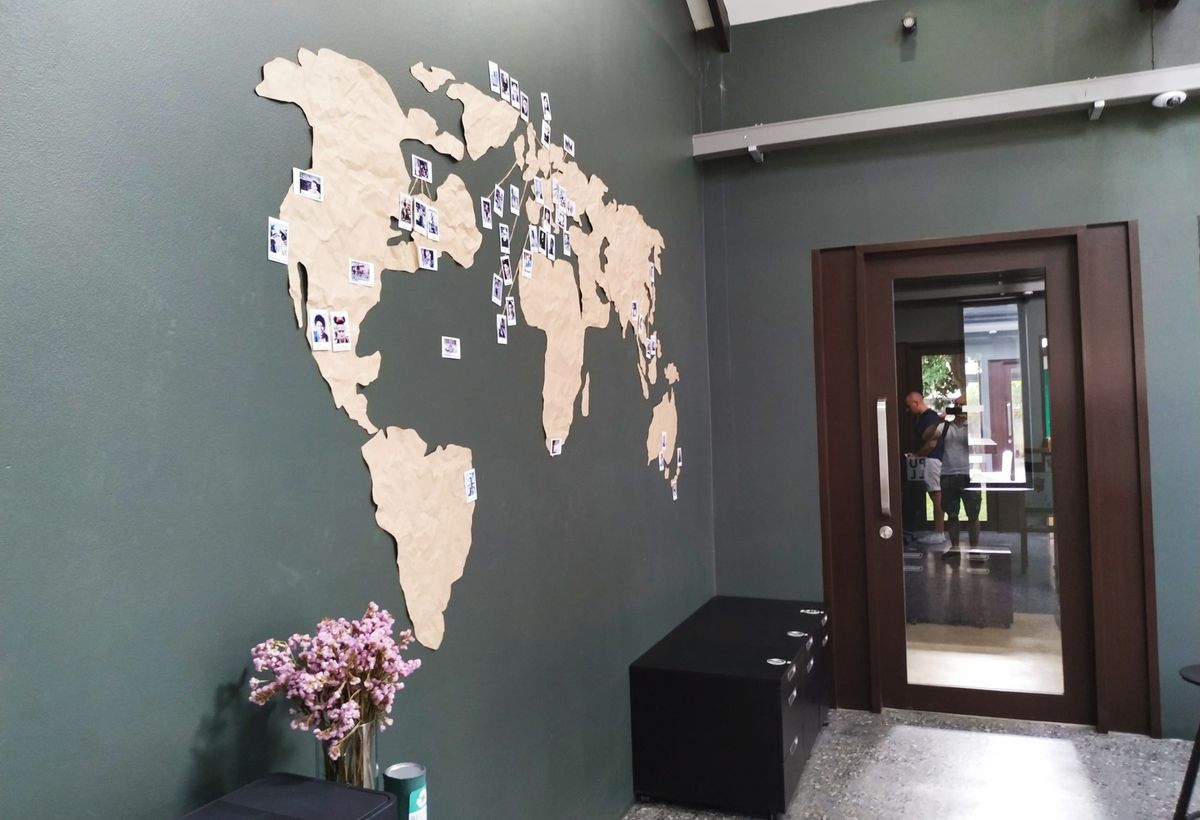e-Estonia and the advent of e-Nations

Technology has always been a disrupting force. But new breakthroughs are happening exponentially faster each year, and they are shaking pillars of our society that were previously considered immutable and eternal. It’s changing our cities, our homes, the way we pay and keep our money, and even the currency we use. In my opinion, the next big technological revolution will be e-Nations.
The last Estonian elections
Estonia was the first country in the world to hold legally binding general elections. It was 2005. Initially, only a small percentage of Estonians supported the initiative. However, support has grown remarkably in a short amount of time, as the last February elections demostrated.
Especifically, 43.6% of the votes were cast online. That’s a record both for Estonia and the world. Regardless of the result, which party won, or the political color of the new Estonian government, the future won the elections this year in Estonia.
Voting is considered the sacred cornerstone of democracy. That’s why initiatives such as Estonian iVoting have been faced with skepticism and aversion by different actors.
Nevertheless, Estonia has proved that electronic elections are perfectly secure if the right precautions and security measures are in place. Simply put, it’s the future, and other countries will soon join this initiative.
In my opinion, in 20 years, the majority of votes in most elections in Europe will be cast online. Voting in person will be seen as something just for senior citizens.
A digital identity for the digital and physical worlds
When the media talks about the e-Residency program of Estonia, the aspect that gets all the attention is how it empowers location independent entrepreneurs to open an online business completely online, without ever visiting Estonia.
Unfortunately, the relevance of this possibility often outshines the power that lies behind the digital nation Estonia is building. The e-Residency ID card is more than just an authentication mechanism.
What Estonia is granting to its e-Residents is the power to securely identify themselves from virtually anywhere, as long as you have access to a internet connection. You can use it not only to access the Estonian online administration, but also to identify yourself in front of any third party that acknowledges and supports your cryptographically based Estonian identity.
One interesting example is the telecommunications company Telia. This mobile network operator is the dominant player in northern and eastern Europe (Sweden, Estonia, Latvia…). Using your e-Residency card, you can sign up for a Telia account, get a mobile phone contract for you, or your company, and you won’t need a single keystroke. All the information is securely stored in your ID card.
Signing and encrypting documents
But you can do more than just using your card for authentication. The same cryptographic technology that identifies you allows you to sign documents. This is similar to your handwritten signature, only more powerful. It will not only certify that you signed the document, it will also certify that the document has not been altered, tainted or corrupted.
And here’s where the possibilities are endless. Work contracts, rental agreements, voting, private arrangements, official paperwork, your taxes, your phone bill, your cable TV subscription…
You can also encrypt documents too, and make them available only to selected parties. The software tools provided by the e-Residency program allow you to encrypt a document for any other e-Resident or Estonian citizen as long as you know his or her personal code. This works for companies and governmental entities too.
Put another way, I can share information with you that only you will be able to see, just by knowing your personal code. And I would be able to share that information on your Facebook feed, knowing that it will be safe from eavesdropping. Only you will be able to make sense of it.
So basically all the ingredients are there to build a truly digital nation. One that allows its citizens to access all services online, to univocally and irrevocably identify themselves, sign contracts, grant access to their data selectively and revoke such access at will. That, in the era of information, is power.
We just need a country willing to take the challenge of offering similar services to its virtual citizens that it does to its physical residents. I see Estonians, pioneers in establishing a universal digital identity, as the perfect candidates.

Far beyond the current possibilities of the e-Residency program
In fact, the e-Residency 2.0 whitepaper, albeit timidly, introduced some interesting proposals that may point to a future where Estonia could become an e-Nation for its digital citizens.
[…] some digital nomads live in a given country for only 2-3 months at a time. this type of nomad can choose their tax residency and their home country. If these kinds of entrepreneurs become e-residents, Estonia can offera social tax model where Estonia collects social tax and also provides health insurance and pension to them.
Estonia e-Residency 2.0 whitepaper
Modern societies are complex, but their fundamental pillars are essentially the same. Governments offer some benefits to its member in exchange for contributing to society (commonly in the form of taxes). Some of them are security (the most simple and omnipresent exchange coin of a state), public infrastructures, and, in more developed countries, access to healthcare, education, pension, etc…
As Estonia is pushing for a deeper integration of e-Residents into the Estonian society and culture, I foresee new exciting services and possibilities opening for us in the near future. Services commonly provided to citizens or physical residents only, such as healthcare or access to a pension, could be a reality in a not so distant future for e-Residents living abroad.
In a world where remote work and a nomadic lifestyle are slowly but steadily becoming the norm rather than the exception, this opens the doors for a new society. One where its members don’t necessarily share the same physical space, but enjoy the same privileges as citizens, namely, access to the services they find essential. Some of them like education or security may be far from reach yet. However, others are rapidly becoming a reality.
Most probably, that was not what the visionaries of the e-Residency program envisioned five years ago. But human imagination, when powered by technological innovation and a little courage, knows no limits.
And that’s exciting.
Beyond citizenships
The concept of nation is bound to change. In the future, your citizenship won’t be strictly determined by your birth, or the citizenship of your parents. People will choose the countries they want to be citizens of, not the other way around.
In this scenario, nations will compete to offer services in order to attract citizens. Just like companies today compete to offer services in order to attract customers.
Currently, thousands of companies have been opened by e-Residents in Estonia. These companies are registered in Estonia, regardless of the citizenship of their founders. They pay taxes in Estonia, hire employees in Estonia and bring business to Estonia. Other countries such as Azerbaijan are considering developing their own e-Residency program, and I expect more to join in the following years.

The advent of e-Nations
But if Estonia ends up offering these social services to e-Residents, everything will change. At that moment, we won’t be talking about location independent entrepreneurs willing to run their companies online. We will be talking about people from all over the world eager to become e-Citizens of Estonia. People who will happily contribute to Estonian’s economy -i.e: pay taxes- in exchange for benefits such as worldwide social security, unemployment compensation or accessing a pension scheme. Benefits they may not even be able to enjoy in their home countries.
That might be a long road ahead, but in my opinion, Estonia may be very close to taking the first step. And it all started 5 years ago with the digital identity contained in the first e-Residency ID card.
Imagine that you were able to get medical attention anywhere in the world, for free, thanks to your public e-Health insurance. That you could live and work anywhere, enroling your children in a different school as your family moved from one country to another. Imagine that you could retire and enjoy your pension even if you’ve been traveling your whole life.
I know I will certainly pay taxes to be a member of that e-Nation, offered by Estonia, or any other country in the world.
e-Nations as e-Citizenship providers
This concept may sound weird today. However, Estonia’s been said to run its country like a tech startup. And just like the gap between old service providers and new tech startups is getting bigger, and pushing the former into oblivion, the same will happen to nations.
Take digital banking, for example. While I run all my personal finances on fintech solutions, I still have one traditional bank account I have not been able to close yet. Today, I tried to do an international transfer with it. It seems I have a limit set by default to zero euros for international transfers. Put another way, I cannot transfer one single euro internationally. In order to raise that limit, I have to go physically to an office in Murcia, Spain. Being in Bali for three months, that’s not going to happen anytime soon.
This and other anachronistic limitations, out of touch with reality, are the reason why traditional banks are doomed to extinction. Their place will be taken by a blossoming market of alternatives such as N26, Revolut, Monzo, and others.
Similarly, countries that understand and embrace this tech-powered revolution soon will flourish, and their economies will blossom, favored by a leak of citizens from other states. As Estonia already demonstrated, the size of a country will no longer be a limitation for the size of its economy, or even population.
Niche e-Nations
These countries will then fight for their citizens, offering competitive services, trying to attract as many happy customers as possible to contribute to their economies. Countries will work like tech companies, like Estonia today. And more competition is always good for the consumers. Especially when we are talking about public services. Things as essential as social security or education.
The e-Citizenship will be a product, with the potential of becoming the main export product of a country. Just like e-Residency may be the main export product of Estonia right now. Think about Finland or Norway productizing its social and educational services. Hong Kong productizing its ultra-competitive entrepreneurial system Or Qatar or Saudi Arabia productizing their paradise-for-the-rich country status, in the digital world.
As a result of this competition, niche e-Citizenships will appear. There will be e-Nations favoring families, rich people, entrepreneurs… Just like today, only in the digital world.
Conclusion
This article discusses the concept of e-Nations as a logical evolution of the e-Residency program. In my opinion, Estonia has paved the way to a future where countries could offer services to their e-Citizens regardless of their location or place of residence.
Indeed, Estonia is actually on the verge of giving an important step in that direction, by granting their e-Residents benefits traditionally offered to citizens or physical residents only. That could start a revolution that would be followed soon by other countries. And I think that revolution, the emergence of e-Nations, would take the world by storm.




Comments ()